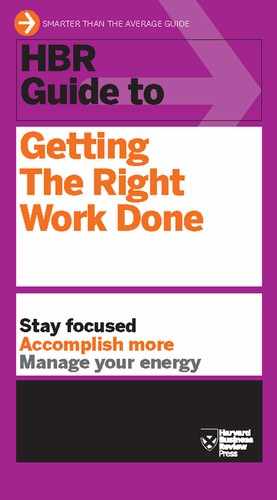Chapter 18
Power Through Your Day in 90-Minute Cycles
by Tony Schwartz
For nearly a decade, I’ve begun my workdays by focusing for 90 minutes, uninterrupted, on the task I decide the night before is the most important to tackle the following day. After 90 minutes, I take a break. When my break is up, I begin the cycle again.
To make this possible, I turn off my e-mail while I’m working, close unnecessary windows on my computer, and let the phone go to voice mail.
I typically get more work done and feel more satisfied than I do for any comparable period of time the rest of the day. It can be tough on some days to fully focus for 90 minutes, but I always have a clear stopping time, which makes it easier.
I launched this practice because my energy, will, and capacity for intense focus diminish as the day wears on. Anything really challenging that I put off tends not to get done, and it’s the most difficult work that generally produces the greatest value. Usually, that means a challenge that is “important but not urgent,” to use Steven Covey’s language. These are precisely the types of activities we most often postpone in favor of those that are more urgent, easier to accomplish, or provide more immediate gratification. (See “How to Stay Focused on What’s Important,” earlier in this guide.)
I first made this discovery while writing a book. At the time, I’d written three previous books. For each one, I’d dutifully sit down at my desk at 7 AM and I’d often stay there until 7 PM.
I never finished a book in less than a year. Looking back, I probably spent more time avoiding writing than I did actually writing. I made lists, responded to e-mail, answered the phone, and kept my desk clean and my files well organized. There were days I never got to writing at all. It was incredibly frustrating.
For my new book, The Way We’re Working Isn’t Working, I wrote without interruptions for three 90-minute periods and took a break between each one. I had breakfast after the first session, went for a run after the second, and had lunch after the third. I wrote no more than 4 1/2 hours a day, and finished the book in fewer than six months. By writing in several cycles of 90 minutes each and building in periods of renewal, I was able to focus far more intensely and get more done in less time.
What made me so productive? Creating the ritual of tackling the most important work at the start of the day and working with my body’s natural rhythms. At the heart of making this work is to build highly precise, deliberate rituals, done at specific times, so they eventually become automatic and don’t require much expenditure of energy or self-discipline, akin to brushing your teeth at night.
Pioneering sleep researcher Nathaniel Kleitman observed that our bodies operate by the same 90-minute “basic rest-activity” cycle during the day that we do when we sleep. When we’re awake, we move from higher to lower alertness every 90 minutes. This “ultradian rhythm,” researcher Peretz Lavie and others have found, governs our energy levels. The human body is hardwired to pulse, and requires renewal at regular intervals, not just physically, but also mentally and emotionally.
Many of us unwittingly train ourselves to ignore signals from our body that we need a rest—difficulty concentrating, physical restlessness, irritability. Instead, we find ways to override this need with caffeine, sugar, and our own stress hormones—adrenalin, noradrenalin, and cortisol—all of which provide short bursts of energy but impair our ability to consistently focus on our work for a significant period of time.
By intentionally aligning with my body’s natural rhythms, I’ve learned to listen to its signals. When I notice them, it usually means I’ve hit the 90-minute mark. At that point, I take a break, even if I’m on a roll, because I’ve learned that if I don’t, I’ll pay the price later in the day.
When I’m not working on a book, I still choose the next day’s most important work the night before, because I don’t want to squander energy thinking about what to do during the time I’ve set aside to actually work. I start at a very specific time, because when I don’t, I give myself license to procrastinate.
Ideally you’ll be able to divide up your day into several 90-minute focused work segments, with brief periods of renewal in between each. However, it’s not always possible to structure your days this way. So make it a high priority to find at least one time a day to focus single-mindedly on your most challenging and important task.
____________
Tony Schwartz is the president and CEO of The Energy Project and the author of Be Excellent at Anything. Become a fan of The Energy Project on Facebook and connect with Tony on Twitter at @tonyschwartz and @energy_project.
______________
Adapted from content posted on hbr.org on May 24, 2011.
